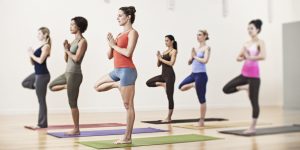
Yoga is an ancient form of exercise that aims to boost physical and mental well-being. The practice originated thousands of years ago in India, making its way to the west in the late 18oos. Yoga comes from the Sanskrit word ‘yuj’ meaning yoke or to join. There are many types of yoga you can practice, such as Iyengar, Astanga, Vinyasa, Yin etc. Many of these practices have their roots in ‘Astanga’ or eight-limbed path.
If you have a health condition, injury or you are pregnant and want to take part in a class, we advise seeking medical advice beforehand. We also recommend that you chat with your yoga teacher before the class starts. Our teachers are more than happy for you to contact them with any questions.
The centre has yoga mats for students to use but you are welcome to bring your own.
If you want to know more about the practice of yoga and teachers’ accreditation, go to the Yoga Alliance website. Go to our yoga teachers’ pages, to find our more about their classes.